- Home
- Simon Kernick
The Hanged Man Page 3
The Hanged Man Read online
Page 3
The man I was with was Dan Watts – or Dapper Dan as he was occasionally called. A short, bald and worryingly good-looking black man with the build of a welterweight boxer, which is what he’d been in his youth until he’d put an opponent in a coma from which he’d never emerged. After that, the story went that Dan had been racked with guilt, and vowed never to box again. He’d turned to the bottle first and then, when that didn’t work, to God and a career in the police force.
I’d known him since my days working organized crime more than a decade back, but we’d lost touch until three months ago when our paths crossed in the Bone Field case. Now, with me exonerated of wrongdoing and back from suspension, we were working together properly for the first time, and for that I owed Dan. I’ve never been the easiest of cops to work with, and I’ve queered my pitch with plenty of bosses, but Dan had specifically requested my presence in the NCA to assist him, and clearly he had a little bit of clout because someone had stuck their neck out and said yes.
I was driving, and I slowed the car as we passed the narrow track leading down to the cottage. We could see the front of Hugh Manning’s driveway.
There was a grimy red Mercedes C Class saloon parked out front.
‘I think that’s our car,’ said Dan, ‘but the plates are filthy, so I can’t confirm.’
Filthy, unreadable licence plates. Always a useful tool for criminals hoping to outwit the network of ANPR cameras that cover the UK’s roads.
I couldn’t see anyone in the cottage’s windows, but I sped up anyway, not wanting to draw attention to ourselves. I was now sure Manning, and presumably his wife too, were in residence. You see, during the search for them we’d also gained access to Manning’s phone records, using them to trace his movements over the previous six months. He’d turned off the phone ten days ago and it hadn’t been used since, but in the weeks before that he’d visited a south London car auction house three times, so it was clear he was in the market for a vehicle, and one that wouldn’t be traced back to him. When we’d checked with the auction house, there was no record of a man with Manning’s name buying a car, but I was pretty certain he had, and thankfully, like most other places in the UK, they had CCTV cameras on site. We ran through footage from the camera at the payment booth the last time Manning had been there, and sure enough there he was, blissfully unaware that he was being filmed, filling out the paperwork and handing over the cash and his fake ID – a passport in the name of Mr Simon Hearn. A quick cross-reference of purchases made at that time had established that Mr Hearn had bought an eleven-year-old Mercedes saloon, the same model sitting outside the cottage now, for eight grand. And because of its filthy plates we hadn’t been able to track its movements.
I had to admit, as criminals went, Hugh Manning was one of the better ones I’d come across in my seventeen years in law enforcement. Unfortunately, that wasn’t going to be of much help to him now.
Fifty metres further along the road, and just out of sight of the cottage, was a lay-by at the entrance to a farmer’s field, partially obscured by a pile of freshly dug parsnips so big you could have run a helter skelter down it. I parked there.
I stretched as I got out of the car. It had been a three-and-a-half-hour drive up here from the NCA’s offices on the South Bank and we’d done it without stopping. We hadn’t called ahead to alert our colleagues in the Lincolnshire force either. There were two reasons for this. First off, there was no guarantee the Mannings were here, so why worry them? Secondly, if the Mannings were indeed in residence, we didn’t want them getting spooked and making a hasty exit before we arrived. I guess in the end we didn’t trust our colleagues to make an effective arrest.
‘This is a good place to stay anonymous,’ said Dan, looking round at the fields stretching off in all directions.
It was a sunny late morning and the only sounds were the cawing of crows in the trees overhead.
‘I like it here,’ I said, taking in the fresh country air, only vaguely tinged with the ripe smell of manure. ‘It’s a good escape from the city. I could retire in a place like this.’
Dan shook his head and grinned. ‘You know, for a man who’s not even forty yet, you sound very old sometimes.’
I shrugged, and we walked fast in the direction of the cottage, keeping close to the hedge that ran along one side of the road so we couldn’t be spied approaching. Neither of us was armed – it wasn’t that kind of op – and we weren’t expecting any resistance, given that Manning was a pen pusher by trade and didn’t have any history of violence. I’d seen he’d recently taken a crash course in Krav Maga though, and he was going to be pretty desperate not to fall into our hands, so I was still feeling a little pumped as we rounded the corner and walked down the track towards the front door.
‘I don’t like this,’ said Dan, who, for a Christian, had a very suspicious nature. ‘It’s already twenty-five degrees out here and all the windows are shut.’
‘Maybe they’ve gone for a walk. It is a nice day.’ I was hoping they hadn’t. I didn’t fancy a long wait. But the car was here so I was certain they weren’t far away. ‘Or maybe they’re just very security conscious.’
As I spoke, I pulled a thin pocket knife from my jeans, leaned down and, without stopping, drove the blade into the Merc’s nearside tyres, one after the other, just to make sure it wasn’t going anywhere.
Dan gave me a disapproving look. He didn’t always like my methods, such as vandalizing a suspect’s car, but on this occasion he chose not to say anything.
We took up positions – him at the back, me at the front – and I knocked hard on the door. It wasn’t a big cottage so if the Mannings were at home they would have heard me. But there was no answer.
I knocked a second time, then opened the letterbox. And that was when I caught a whiff that I recognized immediately. Human death has a peculiar and unmistakable scent, best described as a combination of rancid meat and slowly rotting apples, that’s different to that of every other dead animal, except apparently pigs. You didn’t have to be Sherlock Holmes to realize we were too late. But I needed to make sure, so I donned a pair of plastic gloves and got to work on the single five-lever mortise lock, which wasn’t as new and state-of-the-art as I thought it would be. I’m not the best lock picker in the world but I’m competent, which was more than can be said for the lock, and I had the door open in under three minutes.
I called Dan.
‘I was looking in the back window,’ he said, coming round to the front of the house. ‘There are a lot of flies in there and not much else.’
I told him about the smell. ‘I’ve got a feeling the Mannings have had visitors before us. Do you want to call it in?’
He shook his head. ‘No. Let’s take a look inside first.’
I pushed open the door and the stench hit us both with a warm blast. Whoever was in there had been dead a while, which meant the people we were up against were operating with a lot better intelligence than we had, and that’s never a good sign.
We found her in the bedroom just by following the smell. A well-built woman in her mid-forties dressed in a pink Superdry T-shirt, cut-off denim shorts and espadrilles. She was lying sprawled out face-up on the bed, her arms out to her sides in an almost religious gesture. The body was already bloated from the gases created by the bacteria burrowing away inside her, and her face and neck had turned a discoloured green like pond slime as the body steadily putrified. I’m no pathologist but I know enough about dead bodies to work out she’d been dead at least three days. Even so, as I approached the bed, disturbing the hundreds of flies on the corpse, she was still just about recognizable as Diana Manning. There were five bloodied gashes consistent with knife wounds in the T-shirt close to her heart, and a sixth wound to her belly, but not a lot of blood, which suggested she’d died quickly. My guess was that the killer had stabbed her in the belly to weaken her then, very shortly afterwards – probably in the next few seconds, judging by the absence of blood spatters anywhere else on
the bed – had sat on top of her, pinning her to the bed, and finished her off with the knife blows to the heart. All of which suggested he knew what he was doing.
‘There’s a note here,’ said Dan, who’d stopped by a desk on the other side of the room.
I turned away from Diana Manning’s body, no longer wanting to look at it. It reminded me too much of my own mortality. ‘What does it say?’
‘It’s a suicide note. It says “I am so sorry. I cannot go on.” The notebook’s brand new, looks like it’s never been used before. No tear stains, no marks, nothing on it. And he hasn’t even bothered finishing the whisky. I think if I was sitting a few feet away from my wife of fifteen years I’d just murdered, and I couldn’t go on any more, I’d drain the booze so I could forget what I’d just done, and get the strength to do what I had to do next.’
‘Yeah,’ I said, looking round. ‘And that’s the problem. Where is he?’
Manning’s body was nowhere in the house. We checked everywhere.
In truth, we should have called it in then and there. The rules are simple. If you discover a body, especially if you think foul play is involved, you leave the scene immediately so as not to contaminate it, call in the local CID, and let them set the murder inquiry in motion. But as members of the NCA we were here in an advisory capacity only, and I didn’t want to miss anything before I handed it over to the Lincolnshire force. I’ve never been very good at delegating.
‘So what do you think happened here?’ I asked Dan once we’d done a first pass of the house and were having a last look at the main bedroom.
‘It’s a set-up,’ he said. ‘A Kalaman job.’
The Kalamans. It was a name few people had heard of, yet by any measure they were London’s most successful and secretive organized crime outfit. They’d been operating for close to fifty years and had contacts everywhere, including at various levels within the police force, and both Dan and I were absolutely certain that the current head of the family, Cem Kalaman, was one of the men responsible for the murders of the girls at the farm in Wales.
‘They’ve done this sort of thing before,’ continued Dan. ‘I told you about that case a few years back when a freelance investigative journalist wrote a pretty explosive piece about Cem Kalaman. His lawyers slapped an injunction on the journalist and the newspaper that was going to print the story, and three months later the journalist was found dead in the bath with his wrists slashed. His girlfriend was there too, beaten to death with an iron. No history of violence in the relationship, none of the neighbours heard anything, and the verdict was murder/suicide. That’s what they’re trying to do here. Deflect attention.’
I nodded. ‘I’d go with that. Whoever killed Diana Manning didn’t do it in a fit of passion or anger. It was quick and professional.’ I looked round the bedroom. ‘And this place is way too tidy. There’s no sign of a struggle, and the surfaces have been freshly wiped down, unlike the rest of the house. The only problem’s the obvious one. If this was meant to look like a murder/suicide, then why the hell isn’t Manning here?’
Dan didn’t say anything. He was as puzzled as I was.
It was only when we were doing a final check of the house, just in case we’d missed something obvious, that we spotted it. Well, that’s not quite right. It was Dan who saw the dirty marks on the conservatory roof. I missed them completely. To be fair, they were only just visible – you had to look pretty closely – and Dan was staring out of the spare bedroom window at the time.
When we opened the window we could see from the concentrations of dirt that they were partial footprints – two together facing towards the house and two more about four feet apart pointed towards the edge of the roof.
I looked at Dan. ‘I can’t think what the killers would be doing running along this roof away from the house, so this must be Manning. He made a break for it.’
Dan looked surprised. ‘If that’s the case then he’s got more balls than most lawyers I’ve come across. The Kalamans don’t usually make mistakes. I wonder if he got away.’
I stared out across the empty fields. There were no buildings in sight and, aside from a road in the distance, no sign of human habitation or activity – a welcome change from what I was used to in London but a real challenge for a forty-eight-year-old office worker like Manning who was fleeing on foot from violent killers.
‘Jesus, I hope so,’ was all I said, because the alternative – that the man who was our only real lead after three months of investigation was dead – didn’t bear thinking about.
Two
The SIO from the Lincolnshire force was a very tall, studious-looking fellow, no more than thirty-five, with a marked stoop and a naturally morose face. He sighed loudly as he came over to introduce himself to Dan and me, as if our presence was an irritation, which to be fair it probably was. An hour had passed since we’d called in the locals and the day was getting hotter as it ran into the afternoon.
‘I’m DCI Gibson,’ he said. He looked at me. ‘I recognize you. You’re Ray Mason.’
I put out a hand and we shook. ‘That’s right.’
‘I thought you were suspended.’
‘I’ve been reinstated.’
‘Yes,’ he said, frowning. ‘So I see.’
I often have this effect on people, even some of my fellow police officers. Because I’ve been in the news more than once these past few years, a lot of people know who I am. At least they think they do. To them, I’m an independently wealthy cop with a shadowy past and a pretty controversial present. An air of something not being quite right has always hung over me. There have been allegations of corruption, mental health issues relating to a very public childhood trauma, even extra-judicial killings. And although no wrongdoing has ever been proven, plenty of mud seems to have stuck. And some people – and I guess I’m including DCI Gibson here – don’t like that.
He looked down at Dan, who was a good eight inches shorter than him, like a headmaster addressing a pupil. ‘And you are?’
Dan gave him a look that suggested they weren’t going to get on. ‘Officer Dan Watts. NCA.’
Gibson seemed surprised. ‘So what’s the National Crime Agency doing here?’
Dan and I had already agreed that, like it or not, we were going to have to come clean, so he told him about the dead woman’s husband and his connection to the Bone Field case.
This perked up Gibson’s interest, as it was always going to. The whole country was interested in the murders, which had been a constant feature in the media these past three months. ‘But how are you so certain he wasn’t involved? His wife’s dead in there with stab wounds and there’s a note next to her body which matches handwriting found elsewhere in the house, and which looks as if it was written by her husband.’
This was why Gibson was a DCI. He was no fool. He had a point too. Why couldn’t Manning have killed his wife? But we knew he hadn’t.
‘We think it’s a set-up,’ I said.
‘Carried out by who?’
‘Look, this isn’t for public consumption, DCI Gibson, but we think the ultimate owner of the house in Wales is a major criminal called Cem Kalaman.’
‘Never heard of him.’
‘You wouldn’t have done. But we believe that he, and several other men whose names we don’t yet know for sure, are the ones who killed Mrs Manning.’
‘So why not bring him in for questioning?’
‘It doesn’t work like that,’ said Dan. ‘The guy’s surrounded by lawyers.’
Gibson let slip half a smile. ‘Well, he’s got one less now.’
‘That’s certainly true,’ I told Gibson, ‘but sadly there’s no shortage of lawyers in the world, and it still leaves him with far too many. The problem we have – and you have too, now – is that Cem Kalaman is the head of a business empire worth several billion pounds, and he likes to use other people to do his dirty work. I bet you he’s never been within a hundred miles of this place.’
‘We think he sent peopl
e up here to kill Manning and his wife and make it look like a murder/suicide,’ continued Dan. ‘It’s something they’ve done before. But it looks like Manning was a bit quicker on his feet than they’d been expecting and got away.’ He told Gibson about the footprints on the conservatory roof.
Gibson exhaled. ‘So you think he’s out here somewhere?’
We both shrugged.
‘More likely than not,’ I said. ‘We’ve already got tracks on his credit cards and phones so we can help you find him that way.’
‘Have you got any idea who your friend Kalaman would use for a job like this?’
‘No,’ said Dan. ‘But he’s got no shortage of muscle.’
Gibson rolled his eyes. ‘Great. Well, I’ll get the place taken apart for forensics, and I’ve already got officers doing house-to-house enquiries, but’ – he looked grimly round at the flat expanse of land in all directions – ‘I don’t think we’ve got much chance of finding witnesses. It feels like this one’s got “unsolved” written all over it.’
I was about to comment when a female cop in plain clothes came over and interrupted us. Gibson excused himself and they stood talking in a close huddle along with another older plain-clothes guy. The DCI returned a few minutes later, looking grim-faced.
‘We’ve found another body,’ he said.
The body was at the house of the nearest neighbour, just under a mile away. Two uniformed officers had knocked on the front door, and when there’d been no answer one of them had done exactly what I’d done earlier at the cottage and peered inside the letterbox – which was when she was hit by the smell, just as I had been. She’d also seen a figure on the floor, which was enough for her to raise the alarm.
Fifteen minutes later, decked out in protective coveralls so we couldn’t contaminate the scene, Dan and I, along with DCI Gibson, were directed through the back door of the property by a uniformed officer standing guard. The forensic teams weren’t on site yet and we were able to walk unimpeded through the kitchen and into the hallway, again simply following the smell. I had a strong sense of foreboding, which turned to puzzlement as I approached the body.

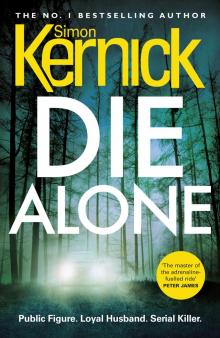 Die Alone
Die Alone Deadline
Deadline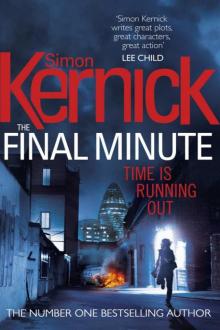 The Final Minute
The Final Minute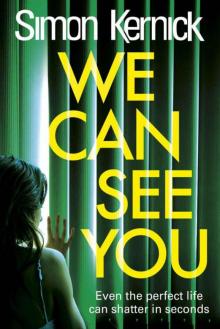 We Can See You
We Can See You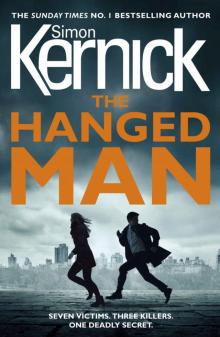 The Hanged Man (Bone Field 2)
The Hanged Man (Bone Field 2)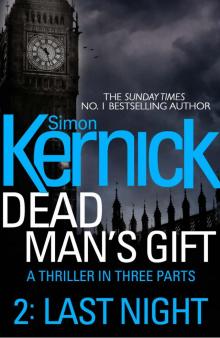 Dead Man's Gift 02 - Last Night
Dead Man's Gift 02 - Last Night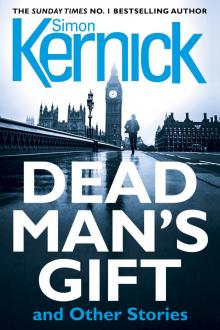 Dead Man's Gift and Other Stories
Dead Man's Gift and Other Stories A Good Day To Die
A Good Day To Die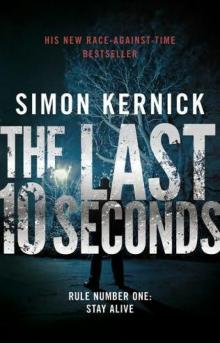 The Last 10 Seconds
The Last 10 Seconds The Murder Exchange
The Murder Exchange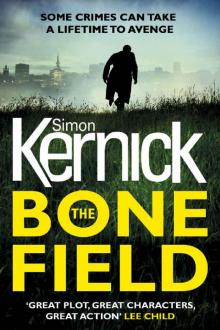 The Bone Field
The Bone Field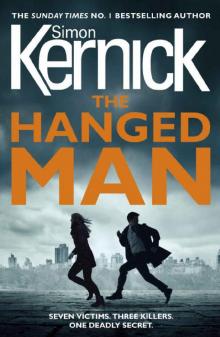 The Hanged Man
The Hanged Man Target
Target The Last 10 Seconds: A Novel
The Last 10 Seconds: A Novel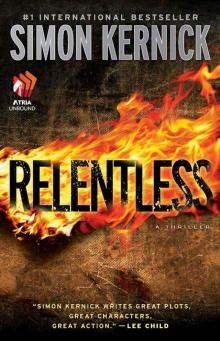 Relentless: A Novel
Relentless: A Novel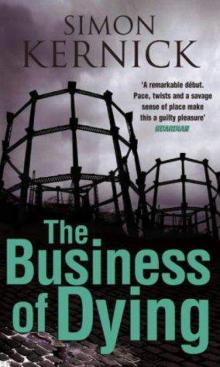 The Business Of Dying
The Business Of Dying Die Twice
Die Twice Flytrap
Flytrap Stay Alive
Stay Alive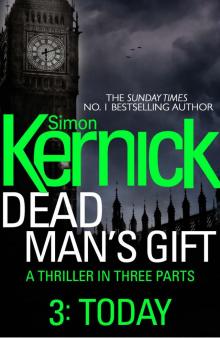 Dead Man's Gift 03 - Today
Dead Man's Gift 03 - Today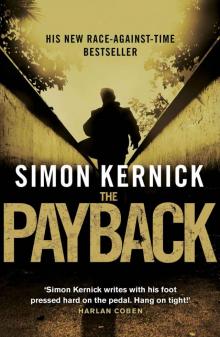 The Payback
The Payback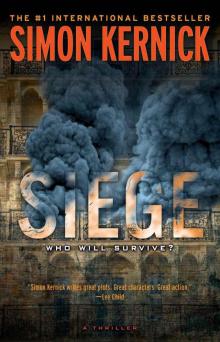 Siege: A Thriller
Siege: A Thriller The Crime Trade
The Crime Trade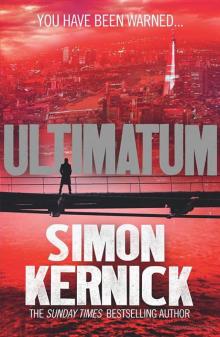 Ultimatum
Ultimatum